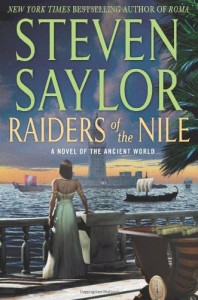There is a rather fine line between pandering to one’s audience, and seeking to please them. Sometimes even very good writers cross the line. Stephen Saylor is indeed an excellent novelist of ancient Rome and its environs and I would recommend his sub Rosa series to anyone interested in learning more about that culture and time. Indeed, I have used one of his novels in a NT class (A Mist of Prophecies). I approached the reading of this novel with a bit of hesitation and trepidation because I found the last one, Seven Wonders, flawed in various respects(see the review on this blog). It was a travelogue without having much of a linear plot to it, and there were some missteps along the way.
Such cannot be said of ‘Raiders of the Nile’ which in some respects is a welcome return to form. The plot is clear (Bethesda, the love of young Gordianus’ life and also his slave, is kidnapped. He must find and rescue her.) The geographical setting is interesting– Alexandria and the Nile Delta region. So is the historical setting of 88 B.C. when there was turmoil for the Ptolemies.
But in fact this novel is so plot and action driven that there is very little historical description involved and the political intrigue is entirely put on the back burner in order to foreground Gordianus’ desperate search for his sweetheart. The sub Rosa series of novels, while not without its occasional light touches, were far more serious in tone than this novel and more historically substantive (as was for instance Saylor’s excellent Roma).
This novel is closer to pure entertainment (the only new fact I learned was that the Pharos lighthouse at the time was the tallest building in the known world), and there is nothing particularly wrong with that. Saylor admits in his Afterword that he has been reading ancient novels (which were mostly the ancient equivalent of Harlequin Romances), and this story shows that influence. But even in that category, if we were going to be entertained by a novel that involves Alexandria, wild animals, intrigue, romance, and the like, I would direct the reader to Lindsey Davis’ Alexandria rather than to this novel.
This novel is an enjoyable after dinner treat, complete with surprise ending, but at time it stretches credulity well past the breaking point (for example Gordianus and Bethesda rescued from the ocean by the King’s barge that just happened to be passing by—- seriously????), and resorts to humor that could never have been part of the ancient world but rather was meant to make a modern audience grin (‘What happens in Canopus, stays in Canopus’).
[Spoiler Alert: Those who have not read any of the sub Rosa series may wish to skip the next paragraph]
And then there is the following problem. For those of us who have been devoted fans of the whole Gordianus series, while it is enjoyable to know of the life of young Gordianus, there can hardly be any absolute suspense to a story like this when one knows already in advance that whatever happens to Gordianus and Bethesda in this tale, it surely cannot be fatal to either of them, since they go on to live long productive lives together. This is always the danger of a pre-quel— it is hard to blow up the balloon and make the plot fly when one knows the general outcome and the destination in advance. So instead, Saylor resorts to turning young Gordianus into a character in an Indiana Jones type tale (even the title does something of an hommage in that direction) or better yet a Pirates of the Caribbean type tale.
Again, there is nothing wrong with pure entertainment, but when one goes the route this novel does, with a much less historically substantive and serious character to the story, one stands in danger of caricaturing one’s own characters and one’s own earlier excellent work. If we simply ask the question Russell Crowe asks from the arena in ‘Gladiator’ ‘Are you not entertained?’ Then the answer is yes. This is an enjoyable romp, and would make good beach reading. But if we ask the question— ‘Are you not educated, enthralled, inspired to learn more of Gordianus’ world?’ the answer is probably no.














